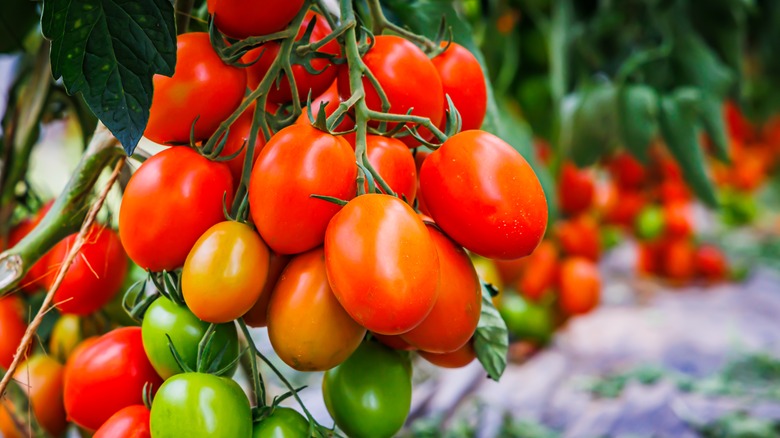TikTok Tests Which Kitchen Scraps Are The Best Compost For Growing Tomatoes
Tomatoes are a prized plant in the summer vegetable garden, so it makes sense that people are always looking for ways to grow a bigger, tastier, higher-yielding crop. On TikTok, @epicgardening shared an experiment in which he buried different items to see how they'd impact both the health of the tomato plants and the amount of fruit they produced. He set up the experiment by starting six of the same variety of tomato plants from seed at the same time. Since the variety of tomato used, Italian Roma, is a determinate variety of tomatoes (meaning it produces one large crop instead of producing throughout the course of a season), it was perfect for this experiment.
When it was time to plant, he dug six holes and filled five of them with different items people claim will help grow great tomatoes — fish heads, whole eggs, leftovers (including pasta, sourdough, and beans), weeds from the garden, and kitchen trimmings. The sixth hole was left empty as a control. The items were buried at the bottom of each planting hole, the tomato plants were planted, and a watering system was set up to ensure all of the plants got the same amount of water. After monitoring their overall health and then harvesting, there were a couple of clear winners: the hole with the eggs and the hole with nothing added.
Why the control group and the egg group thrived
Not only did the control group and the egg group end up producing the most tomatoes overall, they produced a higher number of ripe tomatoes than the other plants did. The hole with the fish seemed to struggle immediately, and the rest were sort of middle-of-the road in terms of production.
Many of the items EpicGardening buried (including fish) are nitrogen-rich. Nitrogen is also one of the key requirements for plant growth in the garden, but during the process of decomposing these items, soil microbes tie up existing nitrogen in the soil, making it temporarily unavailable to plants. The control plant thrived because nitrogen in the soil wasn't being tied up for decomposition, and was therefore available to the plants. What about the eggs? Large pieces of eggshell don't break down in the soil, and since they're not nitrogen-based, soil microbes aren't as drawn to them, leaving them available to help the plant's roots do their job.
